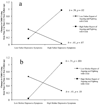A naturalistic observation study of the links between parental depressive symptoms and preschoolers' behaviors in everyday life
- PMID: 21534668
- PMCID: PMC3115427
- DOI: 10.1037/a0023728
A naturalistic observation study of the links between parental depressive symptoms and preschoolers' behaviors in everyday life
Abstract
Previous research has shown that parental depressive symptoms are linked to a number of negative child outcomes. However, the associations between parental depressive symptoms and actual child behaviors in everyday life remain largely unknown. The aims of this study were to investigate the links between parental depressive symptoms and everyday child behaviors and emotional language use using a novel observational methodology, and to explore the potential moderating role of parent-child conflict. We tracked the behaviors and language use of 35 preschool-aged children for two 1-day periods separated by one year using a child version of the Electronically Activated Recorder, a digital voice recorder that records ambient sounds while participants go about their daily lives. Parental depressive symptoms were positively associated with multiple problem behaviors among children (i.e., crying, acting mad, watching TV) when measured both concurrently and prospectively, and with negative emotion word use prospectively. Further, the links between parental depressive symptoms and child crying were moderated by parents' perceptions of parent-child conflict. This study offers the first empirical evidence of direct links between parental depressive symptoms and child behaviors in daily life and presents a promising research tool for the study of everyday child behaviors.
2011 APA, all rights reserved
Figures

References
-
- Achenbach TM. Manual for the Child Behavior Checklist/4–18 and 1991 profile. 1991
-
- Barkley RA. The ecological validity of laboratory and analogue assessment methods of ADHD symptoms. Journal of Abnormal Child Psychology. 1991;19:149–178. - PubMed
-
- Beck AT, Steer RA, Garbin MG. Psychometric properties of the Beck Depression Inventory: Twenty-five years of evaluation. Clinical Psychology Review. 1988;8:77–100.
-
- Cole JC, Rabin AS, Smith TL, Kaufman AS. Development and validation of a Rasch-derived CES-D short form. Psychological Assessment. 2004;16:360–372. - PubMed
-
- Cole PM, Armstrong LM, Pemberton CK. The role of language in the development of emotion regulation. In: Calkins SD, Bell MA, editors. Child development at the intersection of emotion and cognition. Washington, DC: APA; 2010.

